When it comes to Marvel's Cinematic Universe, Thor has always been the most problematic of characters. It's nothing against Chris Hemsworth, who's never less than charismatic when he hoists his mighty hammer into the air, but an issue with the very nature of the Thor character. He's a bulky, blonde, handsome, practically unkillable god. He speaks in formal, almost-Shakespearean English, and has a kiddie-pool level of depth. There's a reason Loki (so fabulously played by Tom Hiddleston) has all but over-shadowed Thor in his own franchise. Loki functions as a snarky commentator, so disgusted by Thor's brawn over brains approach to life, he'd as soon destroy the world rather than hear Thor prattle on for one more minute. Loki's character has the shading and the complexity to leap off the screen; Thor is Superman in a Batman world.
It's fitting then that Ragnarok, easily the best of the Thor movies and an MCU highlight, wipes out everything that makes Thor appear stodgy and boring (his flowing locks, his hammer, his poorly-realized, Emerald City-esque home planet) and does so with a wink and a smile. For the first time since Joss Whedon utilized Thor as a source of comic insults, director Taika Waititi capitalizes on the character's inherent absurdity and uses it to create one of the breeziest, most effortlessly enjoyable films this side of James Gunn's Guardians of the Galaxy series. He emphasizes something that's always been a part of Hemsworth's performance but rarely focused on: his self-aware line delivery.
Waititi also does something I wouldn't have thought possible: he makes Thor an underdog. Thor spends much of the film in a perpetual state of being outmatched. He's easily bested by his sister, Hela, the Goddess of Death (Cate Blanchett, enjoying herself), he's barely an equal to the Hulk, and he's constantly overtaken by the electrical device embedded into his neck that jolts him whenever he attempts to rebel. For the nigh-unkillable god of Thunder, he spends a large portion of the movie getting his ass kicked. All it took was a little humbling to send Thor back to the world of relatability.
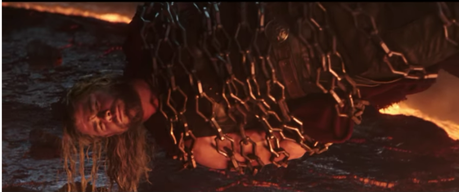
Ragnarok opens with a typically carefree Thor, treating his latest predicament (trapped in a cage, facing fiery demon adversary, Surtur) as an entertaining romp. Thor's tendency to laugh in the face of danger sets the tone for the rest of the film, for better or for worse. For a film that features the death of Odin (Anthony Hopkins) and the destruction of Asgard, it's surprisingly breezy. Even the tumultuous relationship between Thor and his adopted brother, Loki, so often the most interesting, compelling aspect of Thor's narrative (even if it does more to illuminate Loki's character than it does Thor) simply serves as a skeleton upon which to hang as many quips and off-center jokes as possible.
Take the moment, early in the film, in which Thor returns to Asgard, and sees the play Loki (disguised as Odin) has being performed for his own enjoyment. Thor weeping over his fallen brother (Hi, Matt Damon!), praising every trick Loki had ever played on him, portraying him as the hero Loki always wanted to be. There's a potentially darker story regarding a megalomaniacal ruler on the throne of a powerful realm (I'll refrain from a political jab), but isn't it more fun to simply have a Loki willing to let the rest of universe fall to chaos because he'd rather have his ego stroked?
It's a reminder how necessary Loki is to Thor's cinematic success. He's so charming and charismatic, breezing through a world so often in danger of collapsing under its own pomposity, it's easy to forget how much destruction he has caused over the course of his MCU appearances. Loki does something Thor never has quite been able to pull off on his own: he makes his world tolerable, even enjoyable, by rolling his eyes before the audience has a chance.
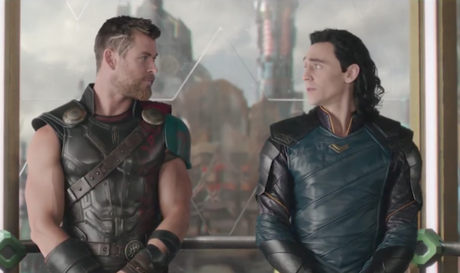
The film has little smatterings of emotional depth and solemnity, but glides safely by them, relieved to not have to pause and ponder. Take the moment when Thor discusses the loss of his hammer, casually reduced to rubble by Hela, as though he's lost a close relative.
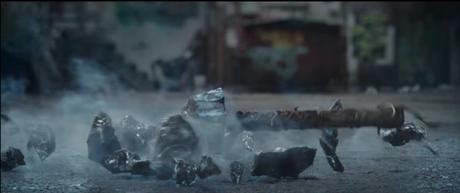
One could read the mournful way in which Thor references his hammer as an Odin stand-in, and that reading is there. It could lead to the revelation that Thor really hasn't let himself grieve the loss of his father. However, the movie would rather land a joke about the intrinsic strangeness about a man that connected to a really big hammer. It's also a film that wipes out the Warriors Three in spectacularly anti-climactic fashion and never has Thor even acknowledge his compatriots have been impaled with swords.
Again, it just doesn't have any interest in taking time away from its jokes to deal with emotions. That approach either works for you or it doesn't, but I have to admit, it's hard to be mad at a movie that entertains as effectively as this one does. The movie is surface-level, but it's a glorious surface. It's always stated that DC's biggest fault is their superhero films are too dour, too humorless. Marvel has never really had that problem. Even the most serious of their films have sprinkled pretty generous portions of humor throughout their run times. This film takes that approach and runs with it, experimenting with color and gags in a way that echoes Doctor Strange (who makes an appearance) and Guardians of the Galaxy more than it does anything else in the MCU.
Putting Waititi at the helm of the MCU's least inspired franchise was an unexpected, but brilliant choice. I found What We Do in the Shadows a bit of a mixed bag, but was completely smitten with Hunt for the Wilderpeople. He takes the best elements of those films and creates a Thor who functions as more of a strange outsider than all-powerful god. It's a reminder that within every hero in the MCU exists a strange, misfit outsider, trying to figure out how to connect with a world into which they don't comfortably fit, and he uses Thor to lean heavily into that concept.
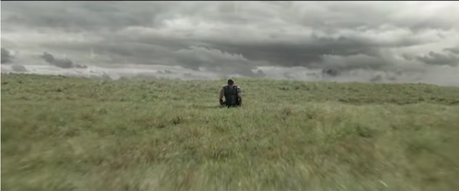
Waititi also makes a big-budget film in a tent-pole franchise feel more like a quirky indie than it has any right to. Narratively, there's nothing going on that's particularly different from any other Marvel film: a villain pops up, causes trouble, and is eventually defeated in a CGI-laden spectacle. But, it's the smaller, between-the-lines details that make the film such a delight. Only in Waititi's world, as rainbow-technicolor as the rainbow bridge that connects Asgard to the other realms, could Thor encounter characters this quirky and bizarre.
Much of that comes from the comic asides sprinkled throughout the film. Waititi's comic approach often revolves a matter-of-fact discussion of absurdity. Korg, voiced by Waititi, operates as a character that, were he not a rock-based lifeform, could exist in any Waititi film. His straightforward acceptance of some truly ridiculous situations serves as the perfect representation of the film's (and, by extension, Waititi's) comedic style.
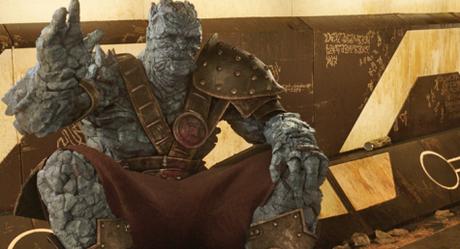
The trailers long ago spoiled the reveal that Thor and the Hulk would be paired together. Narratively, they're both probably the most immature and least thoughtful of the Avengers, preferring to charge in rather than reason their way through a conflict. They interact like two sullen teenagers, frustrated they aren't getting their way, lashing out to cover their own insecurities and frustrations. Once Hulk is transformed back to the far more anxious and far less helpful in a skirmish, Bruce Banner (Mark Ruffalo, leaning into the comedy of Banner's predicament), we're left with two protagonists who approach things in completely opposite fashions, with Banner's hesitation and apprehensiveness contrasted against Thor's leap before you look approach to planning.
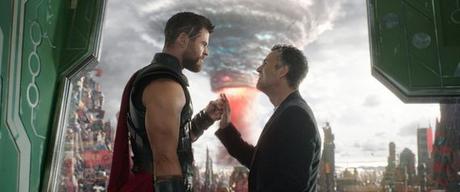
Add in an alcoholic female warrior on a quest for redemption (Tessa Thompson), and you've got the beginnings of a team of characters that actually magnifies Thor's best characteristics (his wit and nobility).
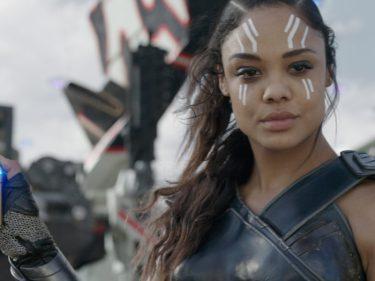
Perhaps the most perfect example of Waititi's approach comes from casting Jeff Goldblum as the Grandmaster, the most Jeff Goldblumey of antagonists. With his perpetually entertained outlook and hedonistic pursuits, he's basically the love child of Jabba the Hut, Stanley Tucci's announcer character from Hunger Games, and well... Jeff Goldblum. He's the ideal off-kilter adversary for this off-kilter world.
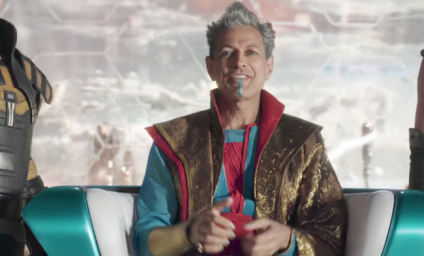
Ultimately, Ragnarok is a film about a feuding family of gods and the built-in humor that stems from higher beings who are just as petty and conflicted as everyday mortals. After all, even Hela, the resurrector of dead armies and one giant wolf, is really just angry her father chose to lock her away and erase her from history. She expected to be greeted with cheers and appears genuinely surprised and hurt when she's instead greeted with terror and resistance. It's worth noting that her green and black attire, as well as her penchant for antlers, make her look a bit like a female Loki.
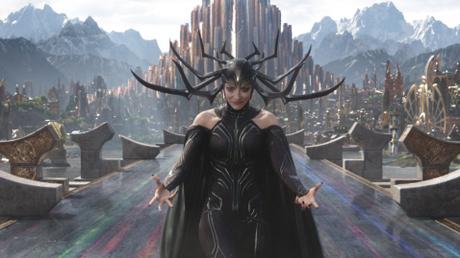
Both exist as the black sheep in a family of gods, whether adopted or not, and both would rather burn the world down than admit their grief at being so easily tossed aside. Again, that could be a heavy, psychologically dark shade to put in the film, but it's never really commented upon. Her surprise at being erased from history is played as much for comedy as anything else.
As far as Norse mythology goes, Ragnarok is the time of destruction. However, it is a destruction that gives way to a rebirth and new creation. In the end, Thor is forced to destroy Asgard (down to its very foundation, as Korg hilariously points out) by releasing the previously captured fire-demon Surtur and allowing the Ragnarok prophecy to come to pass. That destruction brings with it the realization that a world is only as strong as those who inhabit it, and Asgard's citizens have survived, ready to recreate their former world in another location.
If Ragnarok is truly a rebirth in Norse mythology, Ragnarok can also be viewed as a rebirth for the Thor franchise. It's uncertain where the character will go from here, besides straight into the next Avengers movie, but it's possible, after five films and three solo vehicles, Marvel finally has Thor (now joining the regime of the eyepatch-sporting) on the right, lunacy-filled track.

